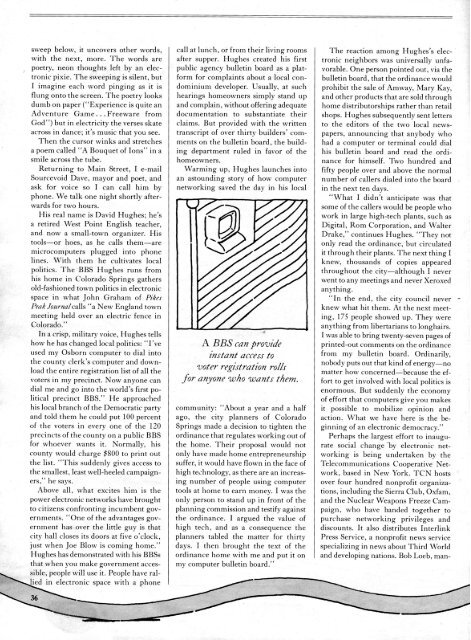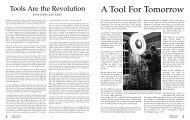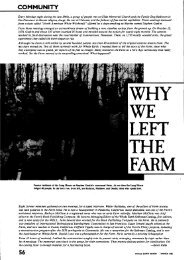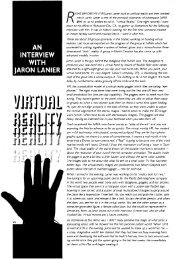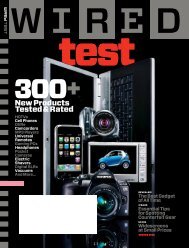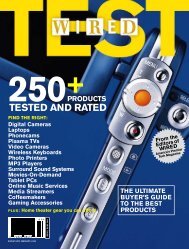PDF version - Kevin Kelly
PDF version - Kevin Kelly
PDF version - Kevin Kelly
Create successful ePaper yourself
Turn your PDF publications into a flip-book with our unique Google optimized e-Paper software.
sweep below, it uncovers other words,<br />
with the next, more. The words are<br />
poetry, neon thoughts left by an electronic<br />
pixie. The sweeping is silent, but<br />
I imagine each word pinging as it is<br />
flung onto the screen. The poetry looks<br />
dumb on paper ("Experience is quite an<br />
Adventure Game. . . Freeware from<br />
God") but in electricity the verses skate<br />
across in dance; it's music that you see.<br />
Then the cursor winks and stretches<br />
a poem called "A Bouquet of Ions" in a<br />
smile across the tube.<br />
Returning to Main Street, I e-mail<br />
Sourcevoid Dave, mayor and poet, and<br />
ask for voice so I can call him by<br />
phone. We talk one night shortly afterwards<br />
for two hours.<br />
His real name is David Hughes; he's<br />
a retired West Point English teacher,<br />
and now a small-town organizer. His<br />
tools-or hoes, as he calls them-are<br />
microcomputers plugged into phone<br />
lines. With them he cultivates local<br />
politics. The BBS Hughes runs from<br />
his home in Colorado Springs gathers<br />
old-fashioned town politics in electronic<br />
space in what John Graham of Pikes<br />
Peak Journalcalls "a New England town<br />
meeting held over an electric fence in<br />
Colorado."<br />
In a crisp, military voice, Hughes tells<br />
how he has changed local politics: "I've<br />
used my Osborn computer to dial into<br />
the county clerk's computer and download<br />
the entire registration list of all the<br />
voters in my precinct. Now anyone can<br />
dial me and go into the world's first political<br />
precinct BBS." He approached<br />
his local branch of the Democratic party<br />
and told them he could put 100 percent<br />
of the voters in every one of the 120<br />
precincts of the county on a public BBS<br />
for whoever wants it. Normally, his<br />
county would charge $800 to print out<br />
the list. "This suddenly gives access to<br />
the smallest, least well-heeled campaigners,"<br />
he says.<br />
Above all, what excites him is the<br />
power electronic networks have brought<br />
to citizens confronting incumbent governments.<br />
"One of the advantages government<br />
has over the little guy is that<br />
city hall closes its doors at five o'clock,<br />
just when Joe Blow is coming home."<br />
Hughes has demonstrated with his BBSs<br />
that when you make government acces-<br />
call at lunch, or from their living rooms<br />
after supper. Hughes created his first<br />
public agency bulletin board as a platform<br />
for complaints about a local condominium<br />
developer. Usually, at such<br />
hearings homeowners simply stand up<br />
and complain, without offering adequate<br />
documentation to substantiate their<br />
claims. But provided with the written<br />
transcript of over thirty builders' comments<br />
on the bulletin board, the building<br />
department ruled in favor of the<br />
homeowners.<br />
Warming up, Hughes launches into<br />
an astounding story of how computer<br />
networking saved the day in his local<br />
A BBS can provide<br />
instant access to<br />
voter registration rolls<br />
for anyone who wants them.<br />
community: "About a year and a half<br />
ago, the city planners of Colorado<br />
Springs made a decision to tighten the<br />
ordinance that regulates working out of<br />
the home. Their proposal would not<br />
only have made home entrepreneurship<br />
suffer, it would have flown in the face of<br />
high technology, as there are an increasing<br />
number of people using computer<br />
tools at home to earn money. I was the<br />
only person to stand up in front of the<br />
planning commission and testify against<br />
the ordinance. I argued the value of<br />
high tech, and as a consequence the<br />
planners tabled the matter for thirty<br />
days. I then brought the text of the<br />
ordinance home with me and put it on<br />
my computer bulletin board."<br />
The reaction among Hughes's electronic<br />
neighbors was universally unfavorable.<br />
One person pointed out, via the<br />
bulletin board, that the ordinance would<br />
prohibit the sale of Amway, Mary Kay,<br />
and other products that are sold through<br />
home distributorships rather than retail<br />
shops. Hughes subsequently sent letters<br />
to the editors of the two local newspapers,<br />
announcing that anybody who<br />
had a computer or terminal could dial<br />
his bulletin board and read the ordinance<br />
for himself. Two hundred and<br />
fifty people over and above the normal<br />
number of callers dialed into the board<br />
in the next ten days.<br />
"What I didn't anticipate was that<br />
some of the callers would be people who<br />
work in large high-tech plants, such as<br />
Digital, Rom Corporation, and Walter<br />
Drake," continues Hughes. "They not<br />
only read the ordinance, but circulated<br />
it through their plants. The next thing I<br />
knew, thousands of copies appeared<br />
throughout the city-although I never<br />
went to any meetings and never Xeroxed<br />
anything.<br />
"In the end, the city council never<br />
knew what hit them. At the next meeting,<br />
175 people showed up. They were<br />
anything from libertarians to longhairs.<br />
I was able to bring twenty-seven pages of<br />
printed-out comments on the ordinance<br />
from my bulletin board. Ordinarily,<br />
nobody puts out that kind of energy-no<br />
matter how concerned-because the effort<br />
to get involved with local politics is<br />
enormous. But suddenly the economy<br />
of effort that computers give you makes<br />
it possible to mobilize opinion and<br />
action. What we have here is the beginning<br />
of an electronic democracy."<br />
Perhaps the largest effort to inaugurate<br />
social change 'by electronic networking<br />
is being undertaken by the<br />
Telecommunications Cooperative Network,<br />
based in New York. TCN hosts<br />
over four hundred nonprofit organizations,<br />
including the Sierra Club, Oxfam,<br />
and the Nuclear Weapons Freeze Campaign,<br />
who have banded together to<br />
purchase networking privileges and<br />
discounts. It also distributes Interlink<br />
Press Service, a nonprofit news service<br />
specializing in news about Third World<br />
and developing nations. Bob Loeb, man-


